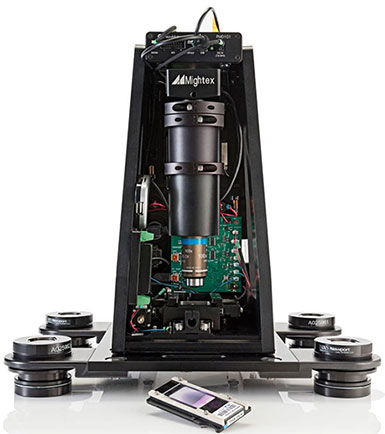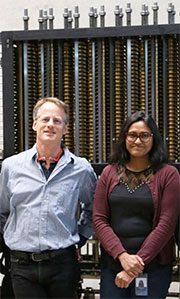September 18, 2017
Electrical engineering doctoral students Charles Delahunt and Mayoore Jaiswal are applying their skills in computer vision and machine learning to the fight against malaria, a disease that affects over 200 million people each year and is one of the most severe public health problems globally. Working with a team at Intellectual Ventures (IV) Lab and with support from the Global Good Fund, they have developed Autoscope, a low-cost, portable and automated device for diagnosing malaria.

Though preventable and treatable, malaria can be difficult to detect. The current diagnosis method is microscopy, which requires highly trained medical professionals to examine blood samples one at a time for parasites. The parasites tend to be very small and challenging to distinguish from distractor objects that also appear in blood slides. Additionally, in communities worldwide where malaria is most prominent, specialists are often in short supply.
Autoscope is alleviating these burdens by allowing for automated diagnosis. The device is small, measuring 15 inches tall by 7 inches wide, and easily transportable. Not only does it automate blood sample scanning and analysis, but it also creates a diagnosis report that includes both the quantity and type of parasites — information that can determine strains of the disease that may be drug-resistant. Autoscope processes samples faster and in batches, and its diagnosis results are more consistent than those yielded by current practice.
 Both Jaiswal's and Delahunt's contributions to the project have involved researching detection algorithms and applying machine learning and computer vision techniques — processing and extracting information from images, pattern recognition and data analytics. The malaria detection algorithms currently achieve performance close to that of an expert malaria microscopist.
Both Jaiswal's and Delahunt's contributions to the project have involved researching detection algorithms and applying machine learning and computer vision techniques — processing and extracting information from images, pattern recognition and data analytics. The malaria detection algorithms currently achieve performance close to that of an expert malaria microscopist.
"Like all IV Lab projects, the Autoscope project combines the best of academia (creative research) and industry (specific, meaningful applications)," says Delahunt. "Plus, the detection algorithms involve lots of mathematical methods and machine learning, which are super fun."
For Jaiswal, who grew up in Sri Lanka where mosquito-transmitted diseases were and, in some cases, continue to be a serious threat, the project's social impact is key.
"In my studies, I've always been interested in applications that help others," she explains. "With Autoscope I get to work with a team to develop something that's going to make a real difference in people’s lives — in many cases, it will save lives — and that is my motivation for doing this work."
Autoscope is currently being tested in malaria-endemic regions around the world. In the future, the team hopes to expand the device's diagnosis techniques to other diseases diagnosable by microscopy.
"As a parent, I feel for parents who must watch their children die of disease," Delahunt says. "If we succeed in the work we’re pursuing, the winners will be kids and families in low-resource communities across the globe, and that’s a very compelling mission."